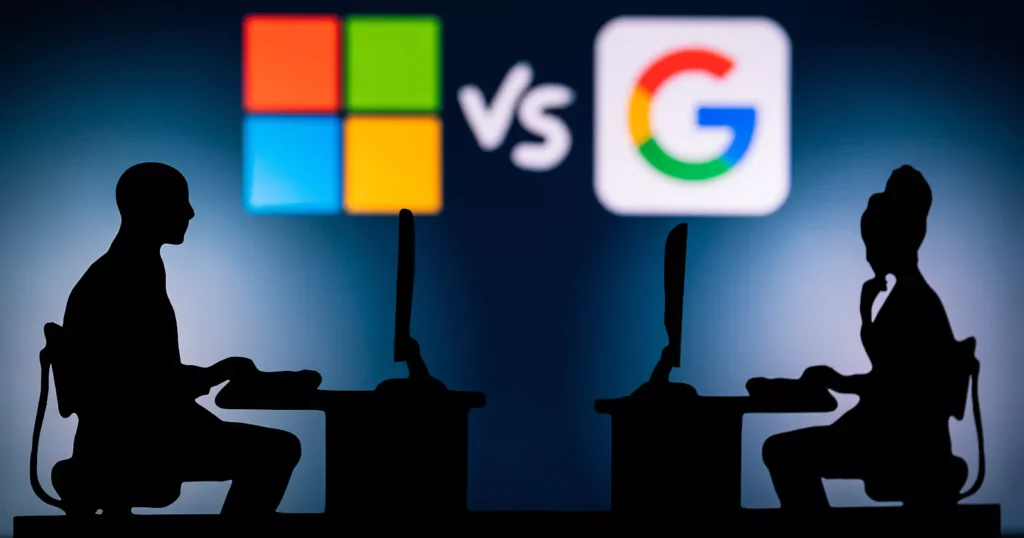Google Criticizes Microsoft Over Bing’s Mimicry of Google Homepage

Google has found itself in a public dispute with Microsoft over a recent redesign of Bing’s search interface, closely resembling Google’s iconic homepage. This controversial move has drawn criticism from Google executives, particularly Parisa Tabriz, Google Chrome’s security chief. Tabriz took to X (formerly Twitter) to express her disapproval, describing Microsoft’s actions as a “new year; new low.” Her remarks highlight a growing tension between the two tech giants as they compete fiercely in the search engine market.
The controversy revolves around a specific feature introduced by Microsoft for Bing. When users search for “Google” or “Google.com” on Bing, especially if not signed into a Microsoft account, the search results page mimics Google’s homepage. The design includes a central search bar, a banner featuring animated figures reminiscent of Google Doodles, and a message encouraging users to participate in Microsoft Rewards by donating to nonprofit organizations. While this might appear as a harmless attempt to enhance user engagement, the resemblance to Google’s interface has sparked allegations of deception.
What makes the situation particularly contentious is how Bing’s branding is minimized in this redesigned interface. The Bing logo is not immediately visible, as it is pushed out of sight unless users scroll or interact with the page. This subtle design choice creates a striking similarity to Google’s homepage, making it challenging for users to distinguish between the two platforms. Critics argue that this tactic could mislead users into thinking they are on Google when, in reality, they are still using Bing.
Tech analysts and industry observers, including those from Windows Latest and The Verge, suggest that this strategy is aimed primarily at users setting up new Windows PCs. These users often default to Microsoft Edge and Bing, with many searching for Google as their first action to switch their default search engine. By presenting an interface that closely resembles Google’s, Microsoft may be attempting to discourage users from making the switch. This tactic, while potentially effective in retaining less tech-savvy users, has raised concerns about transparency and user trust.
The redesign of Bing’s interface is part of Microsoft’s broader effort to compete with Google in the search engine market. Google currently dominates the market, holding an 89.74% global market share compared to Bing’s 3.97%. Over the years, Microsoft has employed various strategies to promote Bing and its Edge browser, including pop-up notifications and changes to Chrome download pages. While Google has also engaged in competitive tactics, such as encouraging users to set Google as their default search engine, it has not taken steps to imitate Bing’s design. This latest move by Microsoft underscores the intensifying rivalry between the two companies as they vie for user loyalty.
The reactions to Microsoft’s strategy have been mixed. Some see it as a clever way to retain users and improve Bing’s market position, while others view it as a deceptive tactic that undermines user trust. Parisa Tabriz’s public criticism reflects broader concerns within Google about the implications of such strategies. Tabriz described the redesign as “another tactic in [Microsoft’s] long history of tricks to confuse users and limit choice.” Her comments echo sentiments shared by many in the tech community who believe that transparent and fair competition is essential for maintaining trust in digital platforms.
This controversy also raises ethical questions about the boundaries of competitive practices in the tech industry. While competition drives innovation and benefits consumers, strategies that blur the line between imitation and originality can erode trust and harm a company’s reputation. Microsoft’s approach may yield short-term gains in user retention, but the potential backlash from industry leaders and users could have long-term consequences for its credibility.
As Microsoft continues to push for greater adoption of Bing, the company faces a delicate balance between innovation and transparency. While the redesigned interface may attract attention and even boost user retention metrics, the risk of alienating users and industry leaders could outweigh the benefits. The mimicry of Google’s homepage serves as a stark reminder of the challenges tech companies face in navigating competition while maintaining ethical standards.
This latest development in the ongoing “search engine wars” highlights the complex dynamics between Google and Microsoft. Both companies are striving to secure their positions in the market, with Google leveraging its dominant market share and Microsoft exploring unconventional strategies to expand Bing’s user base. Whether Microsoft will address the criticism or double down on its approach remains to be seen. For now, this controversy underscores the importance of trust, transparency, and innovation in shaping the future of digital platforms.
